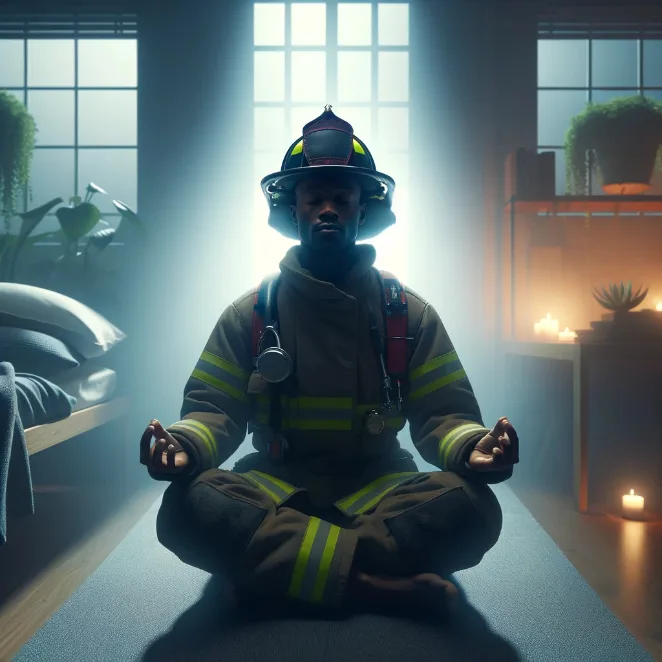
Calm in Crisis: Meditation for Emergency Responders
Emergency responders operate in environments where stress is not just an occasional challenge, but a constant companion. They are tasked with making life-or-death decisions, often in chaotic and unpredictable situations. The high-stress nature of their work can lead to burnout, decision fatigue, and mental health challenges. It's here that meditation emerges as a crucial tool, offering a way to maintain mental clarity, emotional balance, and physical well-being. This article delves into the benefits of meditation for emergency responders, exploring how this practice can be a lifeline in managing the intense demands of their vital roles.
article by Hina Kurosawa
Understanding the Stress of Emergency Response
The life of an emergency responder is marked by unpredictability, high-pressure situations, and exposure to traumatic events. "Each call brings its own set of challenges. You never know what you're walking into," shares firefighter, Lucas Martinez. The nature of such work demands constant alertness and quick, accurate decision-making, often under extreme pressure. Over time, this relentless stress can accumulate, leading to anxiety, depression, and PTSD. The physical toll is equally significant, with responders experiencing high rates of injury and exhaustion. In this high-stakes environment, finding effective ways to manage stress is not just beneficial but essential.

Meditation: A Tool for Mental Clarity and Resilience
Meditation offers emergency responders a way to cultivate mental clarity and resilience amidst chaos. By practicing mindfulness and focused breathing, they can develop the ability to remain calm and centered, even in the face of adversity. "Meditation has been a game-changer for me. It helps me stay composed, especially in high-tension situations," Lucas notes. Regular meditation practice can improve focus, enhance decision-making abilities, and reduce the symptoms of stress and trauma. It allows responders to mentally and emotionally decompress, processing their experiences in a healthy, constructive way. Ultimately, meditation can be a powerful tool in an emergency responder's arsenal, helping them maintain their effectiveness and well-being in their demanding roles.
Implementing Meditation in Emergency Services
Integrating meditation into the daily routines of emergency responders can be both feasible and highly beneficial. This could include structured meditation sessions during shift briefings or providing resources for individual practice. Departments can also consider offering meditation workshops and training, helping responders build a consistent practice. "We've started incorporating short meditation sessions at the start of each shift. It's made a noticeable difference in our team's stress levels," says EMS supervisor, Angela Rodriguez. By making meditation a part of their professional culture, emergency services can support the mental health and resilience of their teams, ultimately enhancing their performance and job satisfaction.
Crisis Meditation Techniques
Emergency responders can benefit greatly from specific meditation techniques designed to be employed during moments of crisis. One effective method is the 'Breath Focus Technique', where they concentrate solely on their breathing, inhaling and exhaling deeply, to maintain calm and focus in high-pressure situations. The 'On-the-Spot Body Scan' is another useful technique, involving a quick mental scan of the body to identify and release tension. 'Visual Anchoring', where workers visualize a calming image or scene, can provide a quick mental escape and refocus their minds. The 'Mantra Repetition' technique, where a calming word or phrase is silently repeated, can also be instrumental in maintaining mental clarity amidst chaos. Short, mindfulness-based practices like these can be crucial in preventing decision fatigue and emotional burnout. Implementing these techniques can significantly impact the ability to perform under pressure, ensuring both their well-being and the efficacy of their critical interventions.
Challenges and Solutions in Adoption
While the benefits of meditation for emergency responders are clear, implementing it as a regular practice faces certain challenges. Time constraints, skepticism, and a lack of awareness about meditation's benefits can be significant barriers. To overcome these challenges, it’s crucial to provide education on the science behind meditation and its relevance to emergency response work. Departments can start with voluntary programs and peer-led sessions to build interest and acceptance. Providing accessible resources, like apps or online guided meditations tailored to the needs of emergency responders, can also encourage adoption. It’s about creating a supportive environment where meditation is seen not as an additional task but as a vital tool for personal and professional well-being.

For emergency responders, meditation is more than a relaxation technique; it's a critical skill for managing the intense demands of their work. By embracing meditation, they can enhance their ability to respond effectively to emergencies, maintain their mental health, and build resilience in the face of adversity. As meditation becomes more integrated into emergency services, it promises not only to improve the lives of individual responders but also to strengthen the entire emergency response system.
Published: 11/23/2023
Modified: 11/23/2023
More predictions
Come back here soon to learn more about yourself and your future


Integrative Body-Mind Training: A Modern Approach
Integrative Body-Mind Training (IBMT) has emerged as a groundbreaking approach in the field of mental and physical well-being. This innovative method, drawing from ancient Eastern practices, is tailored to address the challenges of contemporary life. IBMT stands at the intersection of traditional wisdom and modern science, offering a holistic route to improved health and well-being. Its growing popularity is a testament to its effectiveness in enhancing cognitive function, emotional balance, and overall physical health.


Embracing Aging through Meditation
Aging is a natural part of life, marked by both challenges and opportunities for growth. In this journey, meditation emerges as a powerful ally, helping individuals navigate the complexities of their senior years with grace and mindfulness. It offers a pathway to not only cope with the changes that come with aging but also to embrace them positively. This practice brings a multitude of benefits, from enhancing mental clarity to supporting emotional and physical well-being. By integrating meditation into their lives, seniors can experience a more enriched and balanced approach to aging.


Meditation for Chronic Pain Management
Chronic pain, a pervasive issue affecting millions globally, often challenges conventional treatment methods. Meditation, in this context, emerges as a powerful complementary tool. By engaging the mind and fostering a deeper connection with the body, meditation techniques can significantly alleviate pain, reduce stress, and enhance emotional well-being. This holistic approach not only addresses the physical aspect of pain but also its psychological impact. This article explores five effective meditation techniques, each offering a distinct pathway to managing chronic pain and improving quality of life.